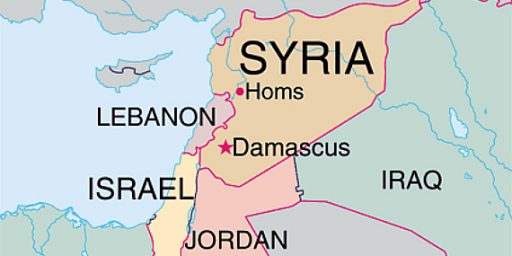Iraqi Sunnis Will Return to Government Talks
Iraq’s main Sunni parties will return to talks about forming a new government later in the week if certain minimal conditions are first met.
Sunni Arabs are ready to end their boycott of talks to form a new government if rival Shiites return mosques seized in last week’s sectarian attacks and meet other unspecified demands, a top Sunni figure said Monday.
[…]
The Sunnis walked out of the talks Thursday after the bombing of a Shiite shrine in Samarra triggered a wave of reprisal attacks against Sunni mosques in Baghdad, Basra and elsewhere. The walkout threatened U.S. plans to establish a unity government capable of luring Sunnis away from the insurgency so U.S. and other international troops can begin heading home.
Adnan al-Dulaimi, whose Iraqi Accordance Front spearheaded the Sunni boycott, said the Sunnis have not decided to return to the talks but are “intent on participating” in a new government. “The situation is tense and within the next two days, we expect the situation to improve and then we will have talks,” he told The Associated Press. “We haven’t ended our suspension completely but we are on the way to end it.” He cited “some conditions” that must be met first, chief among them the return of mosques still occupied by Shiite militants in Baghdad and Salman Pak. Al-Dulaimi did not mention the other demands, but some Sunni politicians have insisted on replacing Shiite police with Sunni soldiers in heavily Sunni areas.
Certainly, not an unreasonable set of demands. And another hopeful sign that the post-Samarra madness may soon end.
Edward Wong suggests that this is not just wishful thinking.
The step could help defuse the sectarian tensions that threatened to spiral into open civil war last week after the bombing of a Shiite shrine and the killings of Sunnis in reprisal.
That bloodletting has amounted to the worst sectarian violence since the American invasion nearly three years ago, and the possibility of Iraqis killing one another on an even greater scale appears to have helped drive Sunni Arab politicians back to moderation, after they angrily withdrew from negotiations last Thursday.
The Bush administration has pegged its hopes for dampening the Sunni-led insurgency, and withdrawing some of the 130,000 American troops here, to Sunni Arab participation in the political process.
[…]
Sectarian violence appeared to be ebbing across Iraq on Sunday, with more people venturing outside for the first time in days. Nonetheless, Shiite militiamen retained control of some Sunni mosques they had raided, and scattered mayhem left at least 14 people dead, including three American soldiers. At least 227 people have been killed since the shrine bombing.
[…]
Mr. Mashhadany said Sunday that the Sunni Arabs would remain vigilant for any broken promises from the Shiites. “We don’t need words on paper,” he said. “We need them to implement these changes.” But he generally struck a conciliatory tone, saying “there’s a desire to accelerate the formation of the cabinet” and adding, “This is from the leadership of all the groups — the Sunnis, the Shia and the Kurds.”
So long as that remains the case, there’s a good chance of getting this thing back on track.





